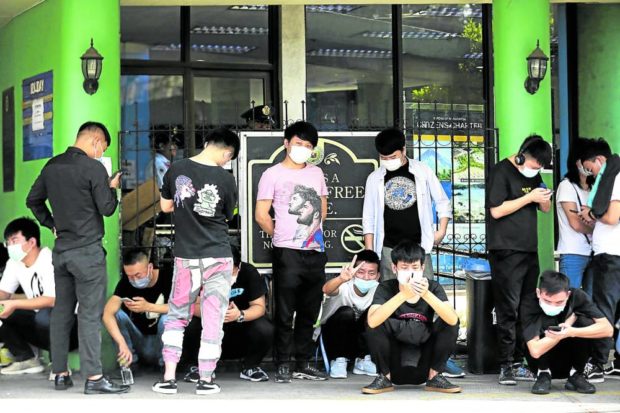MANILA, Philippines — Echoing the view of some senators, a Chinese-Filipino group whose members or kin had fallen prey to kidnappers expressed support for banning Philippine offshore gaming operators (POGOs), amid a series of reported crimes in which their employees, mostly Chinese nationals, had been implicated.
“With the alarming rise of violent crimes related to POGOs and the decreasing collection of tax revenues from its operators, it is high time to reassess [the imposition of a ban],” Ka Kuen Chua, president of the Movement for Restoration of Peace and Order (MRPO), said in an online forum on Saturday.
The event was attended by hundreds of members of the Chinese-Filipino community and the Philippine National Police.
From P7.18 billion in 2020, the taxes collected by the Bureau of Internal Revenue from POGOs and their service providers went down by 46 percent to P3.91 billion in 2021. The projected income this year is P32 billion, although only P3 billion has been collected to date, according to Finance Secretary Benjamin Diokno.
Xi’s request
Chua noted that in August 2019, during then-President Rodrigo Duterte’s state visit to Beijing, Chinese President Xi Jinping himself had requested that online gambling establishments in the Philippines catering to Chinese nationals such as POGOs be prohibited, saying that gambling in China, except in Macau, was illegal. Duterte, however, did not act on the request, citing the billions of pesos in revenues being brought in by POGOs.
“If we have to weigh the social ills that Pogos brought to our country versus the income they generate, we should choose national security. And if this continues, it will erode the good name not only of the Philippines but also of China,” Chua said.
Teresita Ang See, MRPO founding chair and lead convener, said that some legal POGOs companies had told her they were “also suffering because of the bad image given to them.”
But for every legal POGOs company, she estimated that there were “six to seven” illegal sub-licensees, through which Chinese nationals were subjected to human trafficking.
‘This is a national problem’
Data from the Philippine Amusement Gaming Corp. on Tuesday showed that there were 32 POGOs and 127 service providers allowed to operate in the country.
According to Col. Ericson Dilag, PNP Anti-Kidnapping Group deputy director for operations, a total of 17 POGO-related kidnappings were recorded this September alone, surpassing the 12 reported for the whole of 2021.
Dilag said police investigation was hampered by the “noncooperation of victims and witnesses” and the use of digital currencies in paying ransom, which made tracking and identifying suspects more difficult.
Although mainland Chinese mainlanders have been the targets of POGO kidnappings, Ang See asked fellow Chinese-Filipinos, particularly victims and witnesses, to cooperate with authorities in solving the crimes.
“We do not want kidnapping to be a perfect crime where nobody reports, nobody cooperates, and everyone just pays the ransom, making kidnapping a very lucrative business just like in the past,” she said.
“This problem is not a narrow parochial concern of the Chinoy community. This is a national problem that needs a national solution,” Ang See added.
Tighter immigration check
For Sen. Sherwin Gatchalian, China should do its part by not allowing its citizens with criminal records to travel to the Philippines to work for POGOs.
“We have a very weak border control. That’s why [foreign criminals] could easily enter our country,” he said in a radio interview on Sunday.
“China should communicate with us and help us… For one, they could help us in providing intelligence. If those leaving their country have criminal records, they should not let them enter our country,” he added.
Citing reports from the Bureau of Immigration, Gatchalian said many of those behind the recent abductions of POGO workers and other related crimes could be Chinese nationals previously involved in similar offenses in their country.
According to him, immigration agents also discovered that a number of Chinese tourists were trying to avoid them by using fake identities and addresses.
“We should improve our intelligence sharing with China… not just for POGOs, but to [protect] the local tourism as well,” the senator said.
“And if those coming from China are wanted persons, it would be very difficult for us to track them down here. They just come and go without us knowing if they have criminal records in China,” he said.
RELATED STORIES
Move to ban POGOs gets boost from Senate head
Time to make POGOs illegal amid rise in crimes linked to it – Pimentel
POGO summary deportations to begin – DOJ chief
